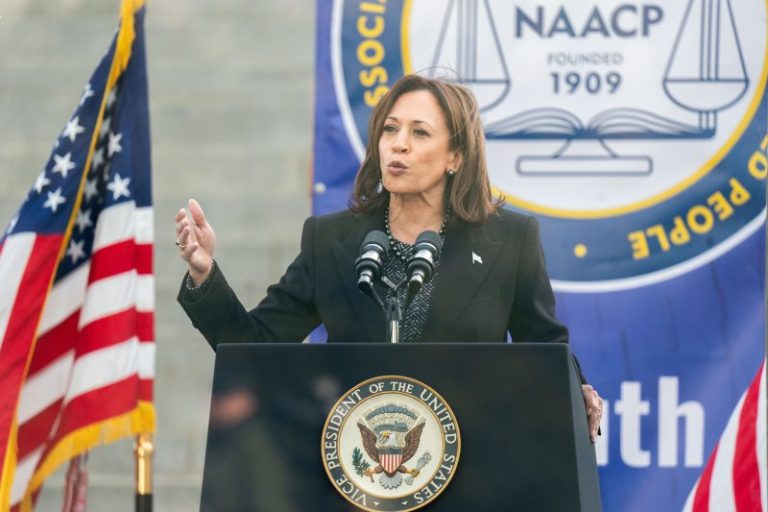Vice President Harris is traveling to the battleground state of Wisconsin on Monday, the 51st anniversary of the Supreme Court decision granting a constitutional right to abortion, to urge greater reproductive freedom as she centers herself in Democrats’ effort to galvanize voters worried about the erosion of reproductive rights since Roe v. Wade was overturned in 2022.
Eighteen months after the Supreme Court overruled Roe, Democrats see the issue of abortion as central to President Biden’s reelection effort. A day after Harris’s Wisconsin speech, she will join the president, along with both of their spouses, at a campaign rally in Northern Virginia “to highlight the stakes of this election for a woman’s right to make her own health care decisions,” according to the Biden-Harris campaign.
Since the decision in Dobbs v. Jackson Women’s Health Organization decreed that abortion rights should be left to the states, Democrats have won a string of electoral victories, fueling the party’s hopes that the abortion issue will propel Biden to reelection despite his low approval ratings. Former president Donald Trump, who is seeking the White House for a third time, has taken credit for the Dobbs decision after he cemented a conservative majority on the Supreme Court by appointing three justices to the nine-member bench.
Democrats have sought to cast that decision as harmful to women and out-of-touch with everyday Americans, and they have warned that if Republicans retake the White House, America would lurch closer to more draconian restrictions, including a national abortion ban.
On Monday, a pair of dueling events in Wisconsin will underscore the divide and the parties’ competing efforts to mobilize voters on each pole. In Madison, the Republican-controlled legislature will hold a public hearing on a bill calling for a statewide referendum on a 14-week abortion ban. Seventy miles away, in the Milwaukee suburbs, Harris will blast such efforts to further restrict reproductive freedom.
The White House said that Monday’s event will kick off a “nationwide reproductive freedoms tour” for Harris, with the times and places of her additional stops yet to be announced. She is expected to highlight the stories of women who have been harmed by the various abortion restrictions imposed by individual states since Roe was overturned.
Harris’s tour is the latest sign that Biden’s team increasingly sees the vice president as an important electoral asset, given her ability to reach audiences, including younger voters and people of color, whose enthusiasm for the president appears to be slipping. Last fall, Harris undertook a month-long “fight for our freedoms tour,” visiting colleges to talk about gun control and other issues.
Most Republican leaders continue to push opposition to abortion as a moral and political cause, though some acknowledge it has hurt them politically. Trump, who leads the polling for the GOP presidential nomination by a wide margin, has aired ads boasting that he “delivered” on abortion and lived “up to his promise” in overturning Roe, but he has not called for a national ban or embraced sweeping rhetoric that could alienate centrist voters.
Harris has honed her abortion message over the past 18 months, warning that the Supreme Court decision is an example of Republican overreach into American lives that will intensify if voters do not stop them at the ballot box. Young voters “just witnessed the highest court in our land take a freedom from them to make decisions about their own body, such that they will have fewer rights than their mothers and grandmothers,” the vice president said on Thursday during remarks at the U.S. Conference of Mayors.
Harris’s supporters say her passion for reproductive choice is organic and closely intertwined with her career in public service. She is the first female vice president, and her Black and Asian identity may be particularly resonant given that abortion restrictions disproportionately affect minority women.
Within the White House, Harris has had more freedom to center herself in the fight for abortion access because of Biden’s discomfort with an issue where the politics of his party do not always mesh comfortably with his Catholic faith.
All this, Harris’s advisers hope, gives her a path to connect with an energized constituency in the 2024 election — and after.
In seizing on the issue, she has traveled to 20 states and held 50 convenings, according to her office, meeting with state legislators, attorneys general and health-care providers. More recently, she highlighted reproductive rights during her eight-state tour of college campuses, repeatedly linking the erosion of abortion rights with what she frames as other Republican efforts to curtail Americans’ freedoms.
“We are witnessing a full-on attack on hard-fought, hard-won freedoms and rights,” Harris said on Jan. 6 in Myrtle Beach, S.C., at the annual women’s retreat of the African Methodist Episcopal Church, the nation’s oldest historically Black denomination.
“Just consider: In states across our nation, extremists attack the freedom to vote. They have the gall to pass laws to ban drop boxes, to limit early voting, to make it illegal to offer food and water to people who stand in line for hours simply to exercise their civic duty and right,” she added. “In states across our nation, extremists pass laws that criminalize doctors and punish women who seek basic reproductive health care.”

